L.2. Commemoration of the tenth anniversary of the United Nations Guiding Principles on Alternative Development: effective implementation and future perspectives (Germany, Peru and Thailand)
PP2
(…)
Colombia: We’d like to support Brazil’s proposal. The language is sufficiently broad. It reflects experience gathered to date. We urge delegations to show flexibility. The text is broad.
Chair: We’ll return to this at 11:15
OP8
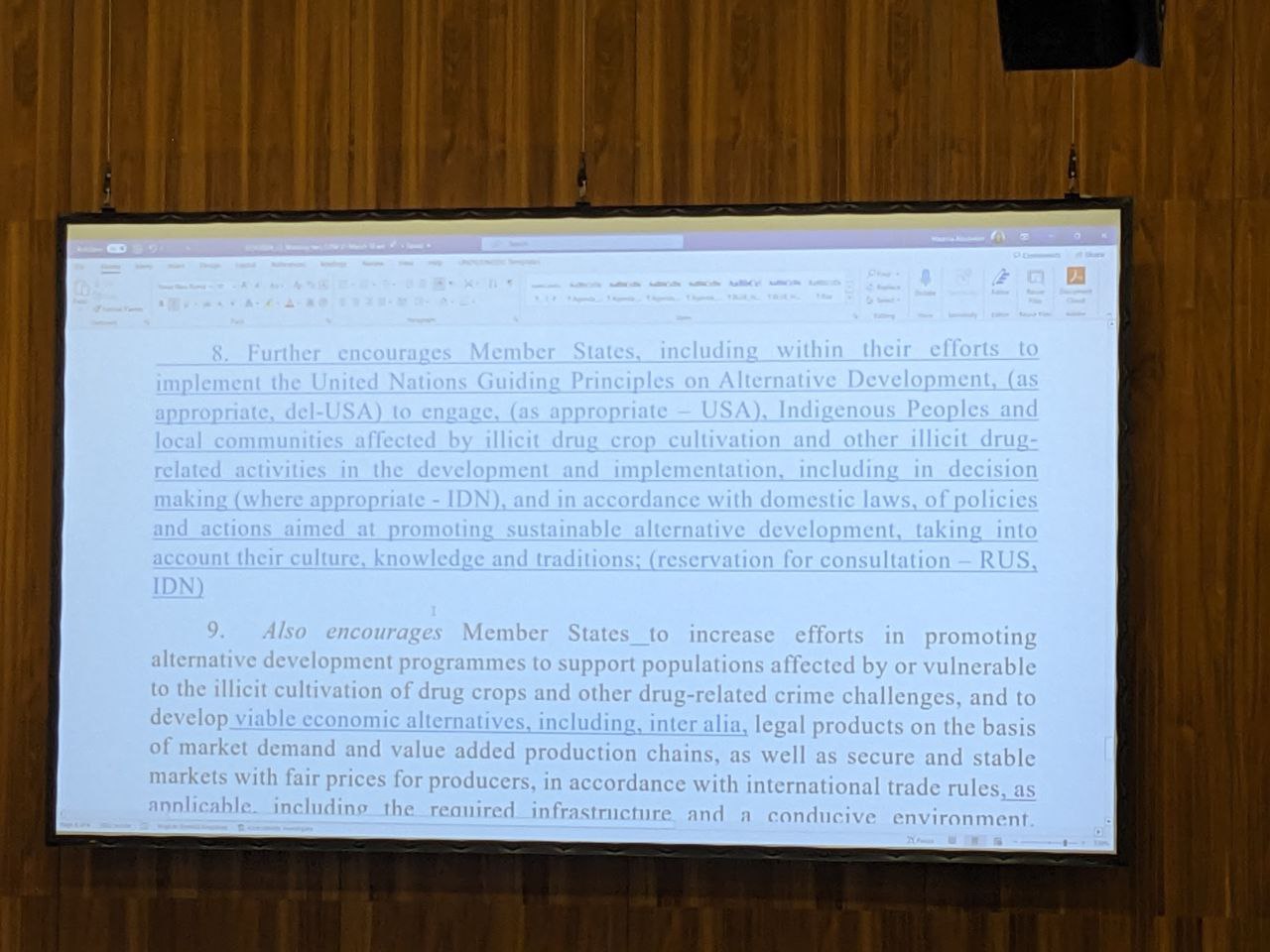
Thailand: Next paragraph is OP8. There’s only reservations by the Russian Federation and Indonesia, and a proposal by Indonesia to add ‘where appropriate’. We already have ‘in accordance with domestic law’. Could our colleagues show flexibility? Or colleagues help us with amendments?
Chair: Not agreed on informals but we want to tackle it. Any requests?
Egypt: Maybe we can put ‘including, where appropriate, in decision making’ and then ‘in accordance with domestic laws’.
Denmark: We don’t want to see qualifying language on Indigenous peoples. WE’re faced with 3 caveats. I’d suggest that we refer to some of the language we agreed on in OP7ALT. I request that we insert the words ‘on international law’. We can add ‘in accordance with domestic and applicable international law’.
Egypt: I don’t know in this part how we can add ‘applicable international law’ in the decision making process if it’s an internal affair of any given state. So I object to this addition. Egypt objected to the term decision making. However, we prefer flexibility on this. If we add ‘decision making’, we have to add a caveat ‘where appropriate and in accordance with domestic law’. Or we omit decisionmaking altogether. Last year, we had no reference to decision making. We request colleagues are flexible and accept these two caveats.
Germany: We’re aware about specific instructions from some delegations on the sensitive issue of Indigenous rights. We support denmark’s proposal based on the paragraph before. There’s a UNDRIP that of course applies also in domestic situations and provides orientation for it, so there’s enough ground to include that reference. On the caveats, there was a way better proposal from the US: ‘as appropriate’ after ‘engage’, which conditions what follows and it makes the text easier to read. Stick to the US proposal and delete ‘as appropriate’ before, because it’s already covered by one big chapeau caveat.
Denmark: My delegation’s concern is that we have the ILO convention and the UNDRIP and they give rights to indigenous peoples. When it comes to decision making in areas that affect them. It would be inaccurate to refer solely on domestic law so we insist in international law. The Guiding Principles themselves don’t refer to domestic laws as appropriate. This OP is already heavily caveated. We can accept this compromise.
United States: (…) it’s the ‘engage’ part that we need to caveat. We support the addition of ‘international law’. We already agreed that the Treaties are the cornerstone of our cooperation on this matter. So we do have to consider these treaties.
Bolivia: We’re interested in the Danish proposal. We support it. It’s important to ensure international laws are taken into account. We also believe it’s important and necessary to include the phrase ‘where appropriate’. That’s not a problem. We can’t be flexible on ‘decision making’. That’s important for us and we explained that earlier. Participation of indigenous peoples in decision making when promoting alternative development in their communities…so I submit this to the room for consideration. The term ‘appropriate’ may be better placed and we propose following Denmark’s proposal.
Russia: We support Egypt’s proposal to remove ‘applicable international’. And the second ‘as appropriate’ after ‘engage’, we want to say ‘in accordance with national legislation’. And then, we put ‘within the’ decision making process. We think this is an alternative perhaps that could be fine for everyone. We hope other delegations act in compromise.
Egypt: Agree with the Russian proposal.
Australia: We could agree with the decision making process but the reference to international law is appropriate here. Article 18 on the UNDRIP: indigenous people have the rights to participate in decision making of matters that affect their rights. Most delegations here, including Russia, Indonesia, and Egypt have ratified UNDRIP…so they should support this important UNDRIP article.
Indonesia: Some language are new, so we need time to understand them.
Peru: Thanks to Egypt and Indonesia for their positions. To address concerns regarding applicable international law, perhaps we could accommodate this at the beginning, where is says ‘where accordance with national legislation and applicable international law’, so the rest of the paragraph would remain the same. We propose it in the hopes of agreement.
(…)
Mexico / Peru?: We made the point that ‘international law’ is accurate. It’s not just UNDRIP. We have agreed on a very similar formulation regarding international law. Why not use the same formulation as in the PPs.
Chair: Indeed, it’s the paragraph above but we need to find compromise. We’ll move forward if we’re not ready.
United States: We appreciate efforts to reach consensus but just referring to the UNDRIP will not work for us. We’re puzzled about he hesitation to cite applicable international law. Regardless of whether we say it, it applies. We encourage member states however. They benefit from us alerting them to what is applicable.
Denmark: Fully support the United States. Agree also with Mexico. The reference to UNDRIP does not capture the situation adequately. We could go along with the compromise proposal of Peru.
Peru: I want to support the US with regard to the application of international law. Hard to digest. But we’re here to work on the text. And our delegation sincerely asks colleagues to be flexible and accept applicable international law. The question of UNDRIP, we feel this is a matter covered in other paragraphs. Show flexibility in this paragraph.
Chair: Strong call to include applicable international law.
Indonesia: There’s a new development here in OP8. For us, including applicable international law, we can accept on OP7, but I think it’s difficult for INdonesia. WE have two solutions: We can accept Russia’s suggestion by adding ‘in accordance with national legislation’, we want ot bring this to domestic issues. ‘Decision making process and in accordance with national legislation’. And then delete ‘as well as applicable international law’. Delete ‘and in accordance with national legislation’ before mention to UNDRIP.
Chair: I know there’s already big support for ‘applicable international law’.
Egypt: We have a proposal. ‘Within the decision making process in the national framework’. If this doesn’t work, we will propose to delete the paragraph altogether.
Thailand: The problem with this paragraph was the ‘decision making process’ and how many caveats added to it. Yesterday we didn’t even mention applicable international law. I’m baffled with the discussion today on this paragraph. We suggest going back to deleting all caveats and going back to the originally proposed this morning. And see whether the room can live with both one or two caveats there, just in relation to the ‘decision making process’. I urge the room not to debate in other parts of the paragraph now. If we can’t reach consensus, we’ll have to bring this back to informals and move on.
Finland: We were so close to an agreement here. Small amendments. Deleted now. ‘Within the decision making’. No one objected to that. It softens the blow a little bit here. If we could agree to keep this element and remove ‘where appropriate’ in the middle of the paragraph, could we not agree perhaps to this? We were so close earlier.
Egypt: Maybe we can have ‘to engage as appropriate’ or ‘where appropriate’ and then after ‘decision making process’, we can say ‘in accordance with domestic laws’. We can accept this paragraph then.
Indonesia: We can be flexible with regard to using ‘as’ or ‘where’ appropriate. We can support the deletion of the previously suggested ‘where appropriate’. We can accept this proposal.
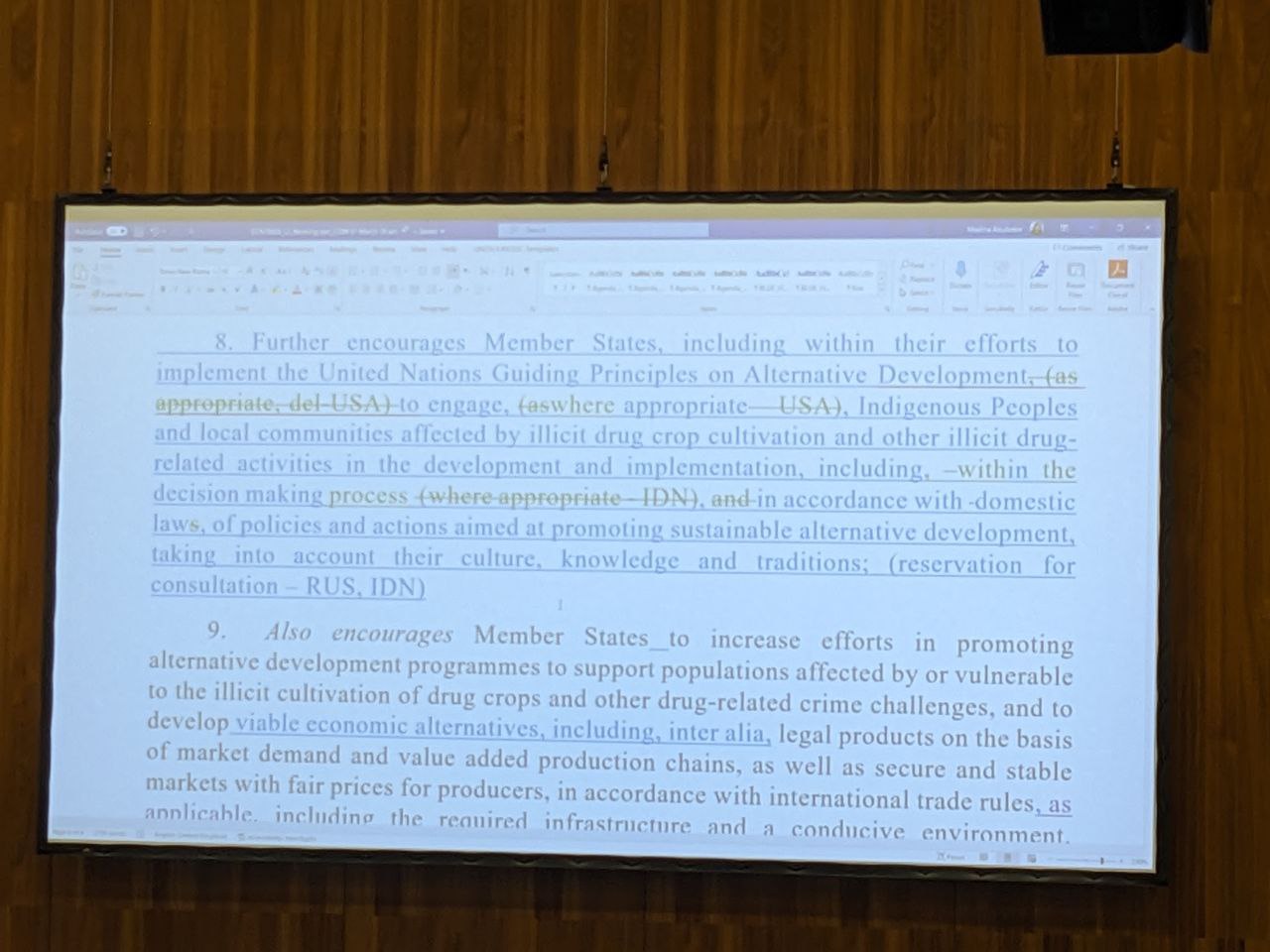
Chair: Can we all agree?
Denmark: We need time.
Thailand: Let’s look at OP3
OP3
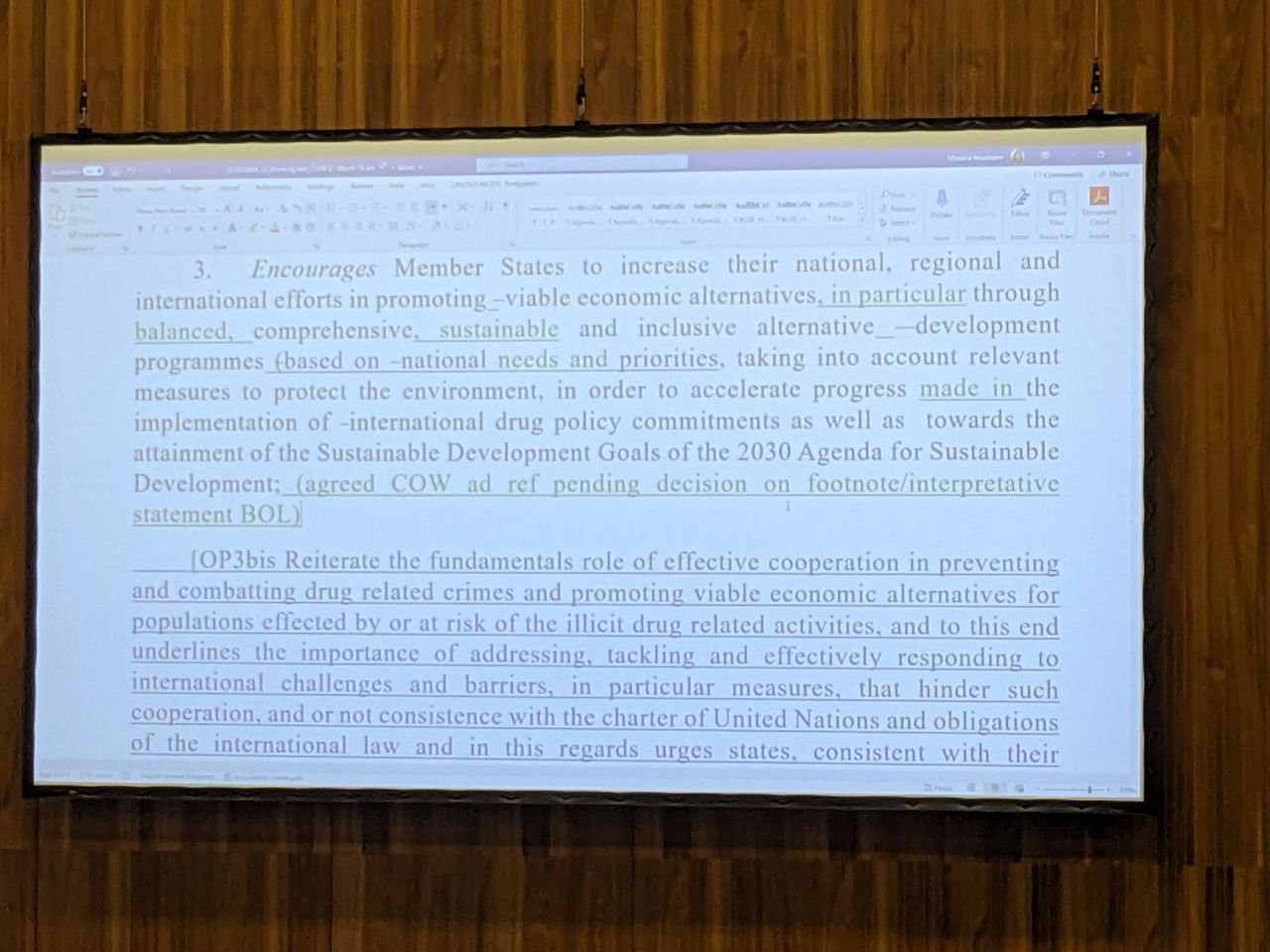
Chair: There was a question on whether Bolivia in case Bolivia can add an interpretive statement. Another one was having a footnote to refert to some Member States not to Bolivia only. As far as remembered, Peru said they were using this term. Internationally, they use alternative development.
Brazil: You need a favorable country? Brazil can support. Brazil can be added then. There’s at least one project in our country that uses that language.
Chair: Can we go with the footnote which will say ‘Some member states use the term integral development’ —something like that, I’m just…Footnote added, then, to OP3. The formulation would be ‘In this context, some Member States refer to integral alternative development.
Brazil: Let me try something ‘Some Member States qualify alternative development programmes as ‘integral’ in specific cases’ or ‘in their national framework’.
Australia: I think it’s important to know if it’s accurate. This is an initiative from Paul VI. Some projects are integral and some others don’t. It depends on the role of the Catholic Church. It may be one or two projects in some countries. Maybe all of them are in Bolivia. Depends on the Church.
Chari: ‘Some Member states describe some alternative development programmes as integral’.
???: Do they also agree that other specifications of those programmes that we have inserted in the paragraph, like ‘balanced, comprehensive and inclusive’. Or do they only use ‘integral’? The other terms are important. We need clarification.
Chair: The only issue here I think is that nationally they don’t use ‘alternative’ as a word. This was the issue. This was not related to the other qualifiers. They use ‘integral’ instead of ‘alternatives’. Bolivia asked for this…
Bolivia: I appreciate the flexibilities and footnotes. I suggest, ‘in these countries, some Member States’… what happens in Bolivia is that all alternative development programmes sponsored by UNODC are deemed ‘integral’. Specifically AD programmes with UNODC.
Philippines: IN the same line as Iran, we want further clarification with regard to the footnote and the word ‘integral’. To my understanding, and I’m not a native speaker, although it’s one of our official languages, it appears hanging when we add an integral. But having heard the statement from Bolivia, perhaps we can expand it to be more direct and specific like adding ‘…integral development programmes’. It’s clearer to whoever reads this footnote in the resolution. If my understanding is correct.
Chair: Sponsors?
Thailand: I think the suggestion by the Philippines is a good one but I’d like to check if that’s how that’s referred to in Bolivia and Brazil. To my understanding, Brazil only sometimes uses that name. But they know they’re AD programmes. I want to say ‘may refer to some alternative development…’
Brazil: Perfect.
Indonesia: Question probably to the Secretariat. I don’t oppose this but is it common practice that we define something in the resolutions? I find it a lot in publications when terms are referred to. But is it common practice to do this? Second answer is that the AD resolution isn’t new. We use the terminology of AD. Even in Guiding Principles. And there’s no footnote. Why now?
Brazil: Perfect.
Indonesia: Question probably to the Secretariat. I don’t oppose this but is it common practice that we define something in the resolutions? I find it a lot in publications when terms are referred to. But is it common practice to do this? Second answer is that the AD resolution isn’t new. We use the terminology of AD. Even in Guiding Principles. And there’s no footnote. Why now?
Mexico: To help each other and you. Simply forget if it’s a bad proposal. Perhaps neutral and factual language would help. ‘“Alternative development programmes” may be referred in some contexts as “integral development programmes”’.
Australia: We don’t use the term and it isnt used in many countries but it matters to one country, Bolivia. The question is whether we care what matters to Bolivia. So we see no harm.
Chair: Not usual to use footnotes. IN this case, we have a request by Bolivia to put it specifically for Bolivia. There was a proposal of an interpretive statement. Another proposal is that if there’s more member states using this term, we can say ‘some member states’. This is how that developed in CoW.
Indonesia: Thanks for the explanation. IN respect of Bolivia, we support.
(…)
???: Perhaps to put a spin on this we could add ‘also’. ‘May also be referred to in some contexts’. It softens the sentence a bit. It may be more palatable for delreg faitons.
Chair: Mexico agrees. Brazil?
Brazil: We’re saying it’s for some countries. Now we deleted ‘some Member States’, it’s unclear. Maybe let’s reinsert ‘in some contexts by some countries’.
Bolivia: Thank you very much for the flexibility. And accommodating the footnote. Thanks also for the contribution of previous speakers. As we see it, the proposal by Mexico and BRazil is good and enjoys consensus.
Germany: In principle we don’t have any issues with the footnote as it’s on the screen but we’re concerned it may affect the interpretation of the term alternative development so we wonder if an interpretive statement is better. Not sure how that works but maye it could address delegations’ concerns.
Mexico: In light of concerns. Attempting to be clearer and specific on specialised contexts where ‘integral’ is used. We can add ‘in some particular contexts’. This covers those specificities.
(…)
Mexico: The footnote is not an interpretive statement. It just explains that it’s how they call this in those contexts.
Brazil: I see there’s 2 times the word ‘some’. It’s repetitive. Nothing would be missed if we delete the first ‘some’.
Chair: Agreed?
Indonesia: We want to keep ‘some’.
Chair: We are fine with some, I see Brazil thumbs up.
Australia: This footnote should attach to the first mention of AD in OP3.
Chair:Can we agree on this footnote to be attached to the first mention of SD?
Iran: I have to explain something – about the environment we don’t have any problem. We are among others that would like to take measures regarding the environment and drug issues. This concept is favourable for other delegations. We could only consider this to be included when there is some understanding that we take text from other resolutions which would be included similarly, including the issue of UCM. Without this Iran can’t give green light on this paragraph. This paragraph does not meet consensus.
Australia: We don’t recognize such a package deal and think paragraphs should be taken on merit
Peru: We are not aware there is a negotiating package – the only delegation opposing the footnote is Iran so perhaps we could state reservation subject to the footnote and can continue with our negotiations.
Chair: I would ask your advice – should we return to the two paragraphs.
Thailand: Since Iran mentioned everything is subject to agreement on OP3bis we should look at OP3bis.
OP3bis
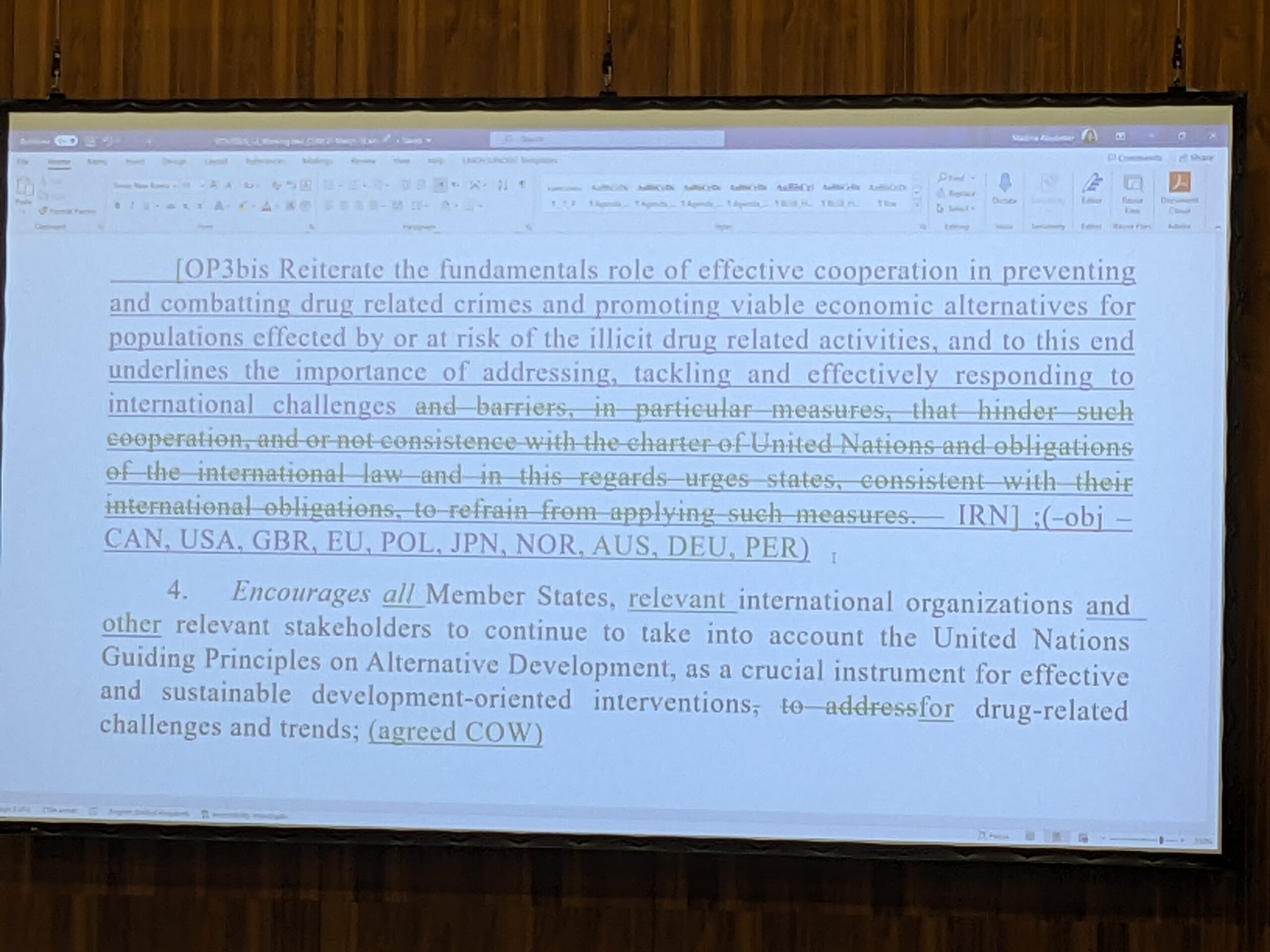
Brazil: Couldn’t for OP3 we agree in CoW and allow only the footnote to be pending. There is nothing in OP3 which is controversial, just the footnote. Couldn’T we agree on OP3 and have the footnote pending.
Iran: It is not about the footnote, it is the whole comment on the environment. We are negotiating the package. This para would only be able to give green light when we consider previously agreed paras. Please note the whole para is objected by Iran.
Thailand: Please mention objection by Iran and move to OP3bis
Peru: We would also like to join with delegations opposing this paragraph. We would like Peru to be added after Germany in this list.
Brazil: We note that views are polarising with regard to this paragraph. I would try something and if there is concern we can withdraw. We can delete from the 5th line “and” until the end. From challenges on. In order to make sense, it could read “drug related challenges” but we are flexible concerning this. I know it is not perfect and some would like more clear wording but some other dels will not take barriers at all. We can withdraw if any concern.
Iran: If some delegations propose something please do not immediately put it in the structure of the text. We are aiming to improve the text and have stronger wording, “not in accordance…” and we will not agree to this proposal.
Thailand: Is there no other comments on this paragraph? It is now 11:30 so I think we will go to informals. I will stop with consideration of L2 after Peru followed by EU.
Peru: I was going to comment on the first paragraph, either 7 or 8 where we were just seeking confirmation from Denmark so perhaps we can have agreed and ref Denmark.
Denmark: We are not prepared to give up reference to international law, but we could say to refer to relevant and applicable international law. This will go back to informals.
EU: I am happy to announce the EU on behalf of ourselves and MS would like to co-sponsor this resolution.
L.3. Promoting rehabilitation and recovery management programmes as part of the comprehensive treatment of drug use disorders (Chile)
Chair: We are about to tackle L3. Floor to EU.
EU: Would like to announce that the EU and member states will co-sponsor the resolution.
Chile: First, the EU and it;s MS for cosponsoring this resolution. We presented a clean text suitable for translation. I will read out the list:
- PP5: pending Iran
- PP8bis: as above
- PP10: problematic for a number of delegations, but the alternative is problematic for others
- PP9: pending Russia
- PP10: paragraph needs more work in infomals
- PP10bis: as above
- PP11: problem with the word ‘peers’
- OP1bis: pending Russia
- OP3bis: pending Russia
Let’s start with PP5, while we wait for Iran. Apologies, Chair, this what suggested for the CoW (wrong text on the screen).
Chair: can you please send the correct text? Apologies we are experiencing technical problems and need 5 minutes.
Chile: Perhaps we can begin with paragraphs agree in informals starting with PP7ter?
Chair: starting with PP7ter that was agreed in informals. I have no comments? It is so decided.
Chile: PP10bis on the screen is next one on the screen. It was agreed in informals
Russia: Don’t disagree, just have an editorial note, should be ‘it’s’ not CND.
Chair: It is so decided.

Chile: PP11bis also agreed in informals.
Iran: We cannot agree with ‘peers’, as was stated yesterday.
Chair: We are dealing with PP11bis, not PP11.
Australia: Happy as is, we suggest that “men and boys” is a basic grammatical clarification.
USA: comma after ‘girls’ is not needed.
Russia: We have the same comment on the comma before girls.
Chair: I have no comments. I proposed we agree on PP11bis in the CoW. It is so decided.

Chile: On PP11, we suggest replacing ‘peers’ with ‘peer groups’ as suggested by Iran. This is agreed language.
Egypt: We support this change if it will bring us to consensus.
Chair: Can we support ‘peer groups’? I don’t see any comments. Can we agree on that? I propose we agree on PP11. It is so decided.
Chile: We can move onto the operative section, OP1 alt bis.

Chair: I understand this is mainly pending due to the Russian Federation.
Russia: We can support this as it is worded now, thank you.
Chair: Can I propose that we agree on OP1 alt bis in the CoW? I don’t see any objections. It is so decided.
Chile: On OP2 here we had agreement without any comment.
Chair: Do I have any comments? There were no comments in informals. I don’t see any comments. Can we agree on that? It is so decided.
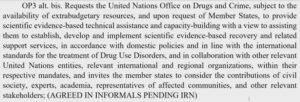
Chile: OP3 alt bis pending agreement from Iran.
Chair: On the screen we now see OP3 alt bis.
Iran: I can ? (muffled)

Chile: Next is PP9. We seek confirmation from the Russian Federation.
Russia: Since the aspects of social reintegration were taken into account, we can agree to this paragraph.
USA: Small grammatical suggestion and happy to drop. The comma should be after ‘factors’.
Russia: Our understanding was including social factors include the environment factors. Does this comma change the meaning? Is this agreed language from somewhere?
Iran: Draw your attention to OP3 alt bis, we remove our reservation and can support it.
Chair: Propose that we agree on onOP3 alt bis in CoW? It is so decided.
USA: Have gone back to the text and there are commas on both sides of the ‘social’, so the way it is on the screen now is correct.
Russia: Do we understand that we retain the comma?
Chair: Yes, both commas.
Chair: Can we agree on PP9 in CoW? It is so decided.

Chile: PP7bis pending Netherlands
Netherlands: I hope we can add to the sunny mood. We don’t agree exactly to this, but will remove our reservation.
USA: Want to be consistent with the agreed language, as per our earlier resolution.
Iran: We need time to consider.
USA: If it’s going to be a problem for some delegations we can remove the change,
Netherlands: We can agree with the removal as it could take us further from the agreed language
Chair: I have no comments. Can we agree on PP7bis? It is so decided.
Chile: PP6bis is pending approval from the delegation of Iran.
Chair: Do I have any comments? If no comments at this stage can I propose that I agree on PP6bis in CoW? It is so decided.
Chile: PP5 is also waiting for confirmation from Iran.

Chair: We are at PP5.
Iran: For the moment, have to consult with capital —we’ll get back to you soon.
Chile: It remains to be considered PP7 —some delegations have difficulties re: standards mentioned in the paragraph. Some want it and others do not. I have a proposal: ‘With appreciation of relevant standards and guidelines developed by UNODC and WHO in the context of recovery and related support services’. That would be it.

Chair: This is PP7 alt. Shortened. Acceptable?
United Kingdom: We always try to think of the reader. Given that there’s no notes on what standards and guidelines we’¡re referring to. Maybe we could add a footnote to make it clear to people who read it where to find them. Maybe that bridges the two positions.
???: Footnote could read ‘The International Standards for the Treatment of Drug Use Disorders and the International Standard on Drug Use Prevention.’
Chair: Can we agree with the footnote? We’ll replace PP7 with PP7alt —which introduces a footnote. No comments. Would love to propose agreeing on this with the footnote in CoW. It is so decided.
Chile: The title. That’s pending. Our proposal is to streamline the title —just referring to what we have in the subject of the resolution. ‘Promoting recovery and related support services for people with drug use disorders’.
Chair: Any comments? Agreed in CoW?
Russia: We need to consult with our capital.
Chair: Will give you some minutes for that.
Chile: The Secretariat pointed out a little mistake in OP3alt —we need to include ‘subject to the availability of extra budgetary resources’.
Chair: It’s in OP3alt-bis. We have it also on OP6.
Chair: We have pending the title of the resolution and PP10 —which is more demanding. I propose we do not go to informals. I give you 15 minutes to work on this.
Chile: Acknowledge your efforts, chair. Procedural question: OP2-bis looks like a separate ‘paper’ —when will we be able to…
Chair: Let’s come back to this situation after the break.
El Salvador: Not opposing your suggestion but pointing out we’re cosponsors.
Chair: Welcome back, we have taken some minutes more but hopefully for a good cause. We ask Chile for progress related to the title, PP5, and PP10. Can we agree with the title as on the screen? I don’t see any comments. It is so decided.

The next is PP5, at the beginning we had requests from Iran to consult with their capital.

Iran: We are ready to agree upon PP5.
Chair: Can we agree on PP5? It is so decided.
Chile: We apparently have consensus now on PP10 in the following language of PP10alt:
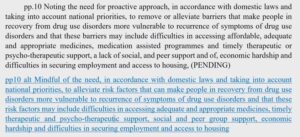
Chair: I will give you some time to look into this.
I propose we agree to PP10alt in the CoW.
United States: We support the paragraph but note that previously the first verb was noting, applying to need and these risk factors include. By changing to “mindful”, we need to reinsert “noting” after “drug use disorders and”.
Russian Federation: We can agree but believe we need a comma before “and” so as to separate the two ideas.
Chair: Can we agree on PP10alt in the CoW? It is so decided.
Chile: There are still a number of additional paragraph proposals pending. They are still being worked on in the room. Perhaps this would be a good time to take these up. Concerning a proposal for paragraph PP10ter, an additional paragraph. Should we send it to you? I will read the PP10ter proposal:

Chair: Can you explain is it agreed or close to agreement?
Chile: This was presented and taken up in informals without comment but not taken up in the CoW yet.
Chair: Can we look at this with the possibility to agree within the CoW?
China: Would it be possible to strike the word “policy” keeping only “science and evidence based programs”, deleting “and policies”.
Egypt: Thank you for this proposed new paragraph. I have double checked the resolution in PP20 of CND 65/4. It says “noting with appreciation the ongoing work and initiatives with other international organisations and civil societies to support member states as applicable in the development and implementation of science based programs and policies on early prevention.” If we apply this paragraph our proposal is to have “and affected communities” in brackets, and add “to support member states, as applicable,” following this we can go along with the remainder of the paragraph.
Chair: Can we look into this?
United States: I think we can work with this proposal and proposal as amended. In this context the word “other” doesn’t make sense, maybe we can delete “other” and say simply relevant organisations. Without policies the word “on” is not necessary anymore, we can instead say “to enhance” or something along those lines.
Russian Federation: We had the same comment on “other” so it is settled.
Chair: Can we look at PP10ter as it is and agree to it in the CoW? We still have affected communities in the bracket, can we delete it? Can we agree on PP10ter as it is now?
Australia: We are wondering if it is possible to have affected communities as this is different to civil society, is there flexibility here?
Chair: I have a question for Chile if this is the only paragraph we have to work on?
Chile: We have one other paragraph almost finished.
Chair: Is it almost finished as this one or actually almost finished? If it is almost finished as this one I propose we take both to informals.
Mexico: The request to delete affected communities can perhaps be changed with the caveat to add “as applicable”.
Egypt: For the time being I need to get back to my experts in this regard.
Chair: Informals are at 14:00 and we continue in CoW at 14:45 with L4.